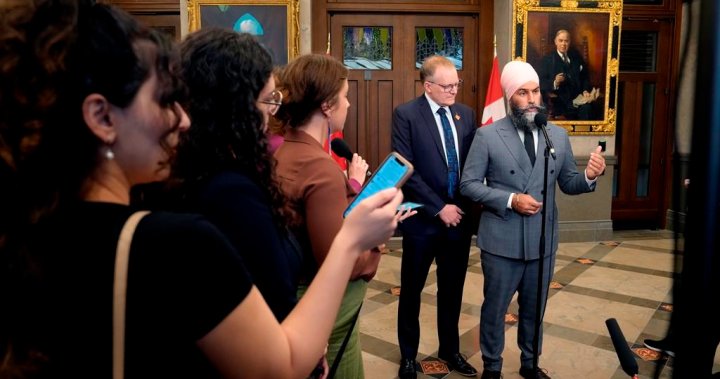The New Democrats have confirmed that they will not be supporting Pierre Poilievre’s Conservatives in their attempt to topple the government next week. Instead, they plan to join forces with the Bloc Québécois to block the non-confidence motion put forward by the Tories. This move effectively eliminates the possibility of a snap election, giving the Liberals more time to govern after a turbulent start to the fall sitting of Parliament. Despite his previous political pact with Prime Minister Justin Trudeau, NDP Leader Jagmeet Singh made it clear that he will make decisions on a vote-by-vote basis in the House and will not be swayed by Poilievre’s challenges.
Singh emphasized that voting against the Conservative motion does not mean that the NDP supports the Liberals. He reiterated his belief that Trudeau has let Canadians down and does not deserve another chance. The Conservatives criticized the NDP for withdrawing their support from the Liberals while still planning to vote to keep them in power. Poilievre accused Singh of being deceptive in his actions, particularly during a federal byelection in Winnipeg where the NDP was defending its seat against the Conservatives. He labeled Singh as a “fake, phoney, and fraud” and questioned the credibility of his future statements.
Following the heated exchange between Poilievre and Singh during Question Period, Poilievre announced his intention to put forward another non-confidence motion at the next opportunity. He highlighted his desire for a carbon-tax election to prevent an increase in taxes proposed by Trudeau. Meanwhile, Liberal House leader Karina Gould emphasized the need for the government to continue its work and noted that Singh has recognized the potential consequences of triggering an election. She declined to comment on whether the government will negotiate with opposition parties to secure their support in future confidence motions.
Bloc Québécois Leader Yves-François Blanchet has not ruled out voting no-confidence in the government in the future. He stressed that his decisions will be based on the interests of Quebecers and Canadians, rather than personal ambitions of political leaders. Blanchet highlighted the importance of a Bloc bill aimed at increasing pension cheques for seniors aged 65 to 74, stating that it is central to the government’s survival. Additionally, the Bloc is pushing for more protections for supply management in the food sector, indicating that failure to deliver on these demands could lead to the government’s downfall.
Anita Anand, the Treasury Board President, refrained from commenting on whether the government would accept the financial implications of the Bloc’s demands. She stated that the focus of the Treasury Board is on prudent fiscal management and implementing measures outlined in the budget. Blanchet emphasized that the Bloc’s power lies in advocating for the interests of Quebecers and Canadians, and they will continue to press for these objectives. The political landscape in Canada remains uncertain as various parties navigate their priorities and alliances in the face of crucial upcoming votes.


